The decision to live alone in Japan is a major commitment. It demands a high degree of financial literacy. It also requires preparedness. Understanding the cost of living alone is the cornerstone of a successful budget. It includes not only recurring monthly expenditures but also significant initial investments. This comprehensive guide provides a deep analysis of every necessary cost when renting apartments in Japan. It offers data-driven strategies for foreign residents looking for an apartment for rent. It also demonstrates how to secure the most viable rent in Tokyo compared to personal income.
Strategic Categorization of Expenses
To successfully manage your finances while living alone in Japan, you must strategically categorize expenditures into three distinct groups. Mastering and controlling each of these cost categories is a critical component of managing your overall Cost of Living Alone and forms the solid foundation required for achieving long-term financial stability.
- Upfront Establishment Costs: These are mandatory, high-value, and non-recurring fees that must be paid before moving into the apartment. They include the Security Deposit, Key Money, and Guarantor Company Fees. This cost group defines the initial financial barrier to entry into the rental market.
- Recurring Monthly Living Expenses: This group covers the core operational costs of daily life. It includes Rent, Utilities (Electricity, Gas, Water), Food, Transportation, and Communication. These are the expenses that consume the majority of your net income.
- Non-Recurring and Contingency Costs: These are large expenditures that are either unpredictable or infrequent. Examples include the initial cost of furnishing the apartment. It is also critical to maintain an Emergency Fund to handle unexpected financial shocks.

Essential Initial Costs: The Barrier to Entry for Apartments in Japan
The complexity and sheer volume of initial payments required before securing a rental property constitute the most substantial financial hurdle. This is particularly true for new tenants in Japan. Unlike many Western rental markets, these fees often accumulate to several months’ rent. Non-refundable and refundable fees require precise financial forecasting. It is absolutely essential.
The initial lump sum required covers various mandatory fees. These fees secure the property, compensate the broker, and provide a financial guarantee to the landlord. You must prepare for these non-negotiable costs before beginning your apartment search.
| Initial Cost Item | In-Depth Explanation | Estimate (Months’ Rent) |
| Security Deposit (敷金 – Shikikin) | A guarantee fund held by the landlord for the duration of the lease. It covers costs for cleaning and repairs that exceed normal wear and tear upon departure. The majority is refundable if the unit is returned in good condition. | 1–2 months’ rent |
| Key Money (礼金 – Reikin) | A non-refundable “gratitude” payment to the landlord. Its prevalence is decreasing in regional markets. However, it remains a common feature in competitive, high-demand areas. This is particularly true for choice rent in Tokyo listings. | 1–2 months’ rent |
| Agency Fee (仲介手数料 – Chūkai Tesūryō) | The compensation is paid to the real estate agency for brokering the deal. This compensation is capped by law at 1 month’s rent plus the national consumption tax. | Maximum 1 month’s rent + Tax |
| Guarantor Company Fee (保証会社利用料 – Hoshō Gaisha Riyōryō) | This fee is mandatory for most foreigners without a suitable Japanese co-signer. This company guarantees payment to the landlord if the tenant defaults, providing the landlord with security. This fee is typically an upfront payment and must be budgeted for. | 0.5–1 month’s rent (initial payment) |
| Prepaid Rent and Management Fee | The rent and common area maintenance fee for the first month must be paid when signing the contract. This payment is required along with the other initial fees. | 1 month’s rent |
| Insurance and Maintenance Fees | This covers mandatory property insurance and non-refundable fees for preparing the apartment. These minor but necessary costs should not be overlooked when totaling the initial expenditure. | Variable |
General Rule: You should budget for total upfront costs for an apartment for rent Japan. These costs typically demand budgeting for 4 to 7 months’ worth of rent. This is before even considering furniture and moving expenses.
Comprehensive Monthly Living Expenses Analysis: The Core of Your Cost of Living Alone
A detailed understanding of monthly expenditures builds a functional budget and allows for strategic control over variable costs. Mastering these categories is crucial for achieving financial stability and maintaining your lifestyle.
Food Expenses (食費 – Shokuhi)
Average Cost: 48,204 yen (All ages). This category provides the greatest opportunity for savings, as dietary habits directly influence this total.
There are two main avenues for food expenditure: self-prepared meals and dining out. Applying a disciplined approach to the former is vital for minimizing overall costs.
- Self-Prepared Meals (Jitaku Ryōri): This is the single most effective way to reduce costs. Successful strategies include bulk-buying rice and seasonal produce, preparing Bento boxes for work, and utilizing late-evening discounts at supermarkets (e.g., Summit, Seiyu).
- Eating Out: This covers casual dining, work-related meals, and convenience store purchases (e.g., Konbini lunches). Frequent dining out can push this expense past 65,000 yen/month.

Utilities and Water Costs (水道・光熱費 – Suidō Kōnetsuhi)
Three core components comprise the utility bill, each with a varying cost structure. Understanding the type of gas used in your apartment for rent Japan is particularly important for budgeting.
- Average Cost: 12,817 yen. This cost ISO highly seasonal, peaking in summer and winter due to climate control needs.
- Electricity (電気 – Denki): The largest utility component. A single person’s monthly average is around ¥6,500 – ¥7,000, rising significantly during periods of heavy air conditioning use. Businesses control costs effectively by switching to competitive deregulated providers.
- Gas (ガス – Gasu): Used for cooking and heating water. LP Gas (propane) is notoriously expensive, often costing up to 50% more than City Gas. Foreign residents should prioritize units with City Gas access when searching for apartments in Japan. Average is around ¥3,000 – ¥3,500.
- Water (水道 – Suidō): Often billed bi-monthly and the most stable utility cost. Average is around ¥2,000 – ¥2,500 per month.
Transportation and Communication Expenses (交通・通信費 – Kōtsū Tsūshinhi)
You can achieve significant savings in the communication sector. This is a flexible part of your overall Cost of Living Alone. Your workplace often determines your transportation costs. Leveraging modern mobile plans offers immediate cost relief.
- Average Cost: 20,564 yen. This essential category covers your connectivity and mobility within the city.
- Transportation: Employers usually cover commuting costs through a monthly Teikiken (commuter pass). You must manage personal travel expenses such as weekend rail travel, bus fares, and occasional taxis.
- Communication: This includes mobile phone service and home broadband internet. Mobile virtual network operators (MVNOs) like Ahamo, LINEMO, or Rakuten Mobile offer affordable plans. These plans cost as low as ¥2,000 – ¥3,000 for high data volume. These plans save thousands compared to legacy carriers. Home Internet fixed costs average ¥4,000 – ¥6,000 per month.
Health, Personal Care, and Discretionary Spending
You must rigorously manage your highly personalized remaining expenses. Although discretionary spending is essential for quality of life, you should be the first to curtail it during lean months.
These categories cover everything from mandatory health fees to personal grooming and leisure activities. They are necessary for well-being but are the most flexible elements of the monthly budget.
- Healthcare (保健医療費): 8,502 yen. This represents the 30% co-payment portion for medical services under the mandatory National Health Insurance system.
- Daily Necessities (日用品費): 5,938 yen. Essential consumables like cleaning supplies, toiletries, and paper goods. Experts recommend purchasing bulk items or utilizing Daiso/Seria (100-yen shops) for specific goods.
- Entertainment/Hobbies (教養娯楽費): 20,375 yen. This highly variable category covers gym memberships, cinema tickets, language classes, and subscriptions. This is the first place to look when seeking to cut expenses.

Regional Cost Comparison: Rent in Tokyo vs. Other Major Cities
Location is the single most influential factor in the cost of living alone. Comparing rent in Tokyo with other large cities emphasizes the significant savings. These savings are available when choosing an apartment for rent Japan outside the Kanto region.
The disparity in rental prices between metropolitan centers like Tokyo and thriving regional cities like Osaka and Fukuoka is substantial. This variance directly impacts an individual’s capacity to save money monthly.
| Apartment Type (1K/Studio) | Rent in Tokyo (23 Wards) | Rent in Osaka (City Center) | Rent in Fukuoka (City Center) | Percentage Difference (vs. Tokyo) |
| Average Studio (1K/1R) | ¥80,000 – ¥100,000 | ¥60,000 – ¥80,000 | ¥50,000 – ¥70,000 | Osaka: 20-30% Lower |
| 1 Bedroom (1LDK) | ¥120,000 – ¥150,000 | ¥90,000 – ¥110,000 | ¥70,000 – ¥95,000 | Fukuoka: 40-50% Lower |
Analysis: Choosing an apartment in Osaka or Fukuoka offers immediate and substantial savings, particularly on rent—the largest fixed expense. Opting for Fukuoka instead of a central area of Tokyo saves ¥30,000 to ¥50,000 per month. This amount can be directly allocated to savings. It can also be added to a larger contingency fund.
Financial Contingency and The Power of the Emergency Fund
Living alone means assuming sole financial responsibility. Therefore, a robust financial safety net is non-negotiable for long-term residency.
The first crucial expenditure demanding careful planning is the initial cost of furnishing your apartment. The second is establishing a financial reserve for unexpected crises. These funds secure your living environment and future stability.
- Initial Setup Costs (Furniture/Appliance): Beyond the rental fees, the average single person will spend ¥150,000 to ¥300,000 to purchase essential appliances (e.g., refrigerator, washing machine, microwave oven). Smart saving involves sourcing pre-owned items from Sayonara sales or used goods stores.
- The Emergency Fund: This fund is a dedicated savings pool. It should be equivalent to 3 to 6 months of your total calculated expenses (Rent + Living Costs). This fund mitigates risks associated with unexpected job loss, significant medical bills, or sudden international travel.

Financial Leverage from Arealty and Your Next Steps
Navigating the complexities of initial costs, regional differences, and landlord requirements when seeking apartments in Japan requires expert guidance. Arealty specializes in bridging the gap between the Japanese rental market and foreign tenants.
We simplify the convoluted rental process by offering specialized services tailored to the international resident. Our goal is to ensure cost transparency and secure the best financial terms for your tenancy.
- Cost Transparency: Full itemized breakdown of initial costs, clearly detailing refundable vs. non-refundable fees.
- Budget Optimization: Strategic sourcing of low-cost entry properties, such as units waiving Key Money or properties requiring only a 0.5-month deposit, significantly reducing your upfront financial burden.
- End-to-End Support: Comprehensive guidance through contract translation, utility setup (e.g., Gas, Electricity, Internet), and local registration procedures.
Don’t let complex initial costs or high rent in Tokyo derail your plans for independent living. Contact an Arealty expert today. You will receive a personalized cost analysis. You will also get a curated list of the best apartments for rent in Japan. These options are optimized for your specific budget and regional preference!
Conclusion
The pursuit of an independent life in Japan is a major, rewarding endeavor. Your financial success is directly correlated with the rigor of your budgeting process, which is the key to managing the overall Cost of Living Alone. First, internalize the average costs derived from the 2024 Household Survey data. Then, strategically control variable expenses like food and utilities. Finally, strictly adhere to the fundamental formula (Net Income – Living Expenses – Savings = Maximum Rent). By doing this, you establish an impenetrable financial foundation. Whether you choose the dynamic urban environment of rent in Tokyo or the affordability of regional centers like Fukuoka, proactive financial planning ensures comfort and stability. It guarantees the complete realization of your independent goals in Japan.






Leave a Reply